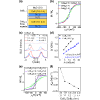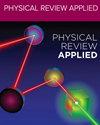交换耦合复合多层纳米点中零场天电离态的演化
IF 4.4
2区 物理与天体物理
Q2 PHYSICS, APPLIED
引用次数: 0
摘要
稳定在多层纳米结构中的环境磁性天融子因其与用于存储器和非传统计算应用的磁隧道结(MTJ)器件的相关性而备受关注。然而,使用传统金属或氧化物多层纳米点构建的现有天电离子纳米结构无法同时满足纳米级天电离子稳定性以及全电读出和操纵的要求。在这里,我们开发了一种由金属[Pt/CoB/Ir]3 和氧化物[Pt/CoB/MgO]元件组成的少重复混合多层平台,这些元件耦合在一起,演变成一个单一的复合堆栈。小至 50 纳米的零场(ZF)skyrmions 稳定在混合多层纳米点中,通过改变 CoB 厚度和点的大小,可对其进行高达 2 倍的平滑调制。同时,小偏置场也能稳定天电离多子。最重要的是,我们在大小适中的低各向异性纳米点中观察到了具有不同磁化旋转的高阶 "目标 "天电离。这些结果为实现稳健的天电离 MTJ 提供了一条可行的途径,也为多态天电离器件概念提供了另一种可能性。本文章由计算机程序翻译,如有差异,请以英文原文为准。

Evolution of zero-field skyrmionic states in exchange-coupled composite multilayer nanodots
Ambient magnetic skyrmions stabilized in multilayer nanostructures are of immense interest due to their relevance to magnetic tunnel junction (MTJ) devices for memory and unconventional computing applications. However, existing skyrmionic nanostructures built using conventional metallic or oxide multilayer nanodots are unable to concurrently fulfill the requirements of nanoscale skyrmion stability and all-electrical readout and manipulation. Here, we develop a few-repeat hybrid multilayer platform consisting of metallic and oxide [] components that are coupled to evolve together as a single, composite stack. Zero-field (ZF) skyrmions with sizes as small as 50 nm are stabilized in the hybrid multilayer nanodots, which are smoothly modulated by up to by varying thickness and dot sizes. Meanwhile, skyrmion multiplets are also stabilized by small bias fields. Crucially, we observe higher-order “target” skyrmions with varying magnetization rotations in moderately sized, low-anisotropy nanodots. These results provide a viable route to realize robust skyrmionic MTJs and alternative possibilities for multistate skyrmionic device concepts.
求助全文
通过发布文献求助,成功后即可免费获取论文全文。
去求助
来源期刊

Physical Review Applied
PHYSICS, APPLIED-
CiteScore
7.80
自引率
8.70%
发文量
760
审稿时长
2.5 months
期刊介绍:
Physical Review Applied (PRApplied) publishes high-quality papers that bridge the gap between engineering and physics, and between current and future technologies. PRApplied welcomes papers from both the engineering and physics communities, in academia and industry.
PRApplied focuses on topics including:
Biophysics, bioelectronics, and biomedical engineering,
Device physics,
Electronics,
Technology to harvest, store, and transmit energy, focusing on renewable energy technologies,
Geophysics and space science,
Industrial physics,
Magnetism and spintronics,
Metamaterials,
Microfluidics,
Nonlinear dynamics and pattern formation in natural or manufactured systems,
Nanoscience and nanotechnology,
Optics, optoelectronics, photonics, and photonic devices,
Quantum information processing, both algorithms and hardware,
Soft matter physics, including granular and complex fluids and active matter.
 求助内容:
求助内容: 应助结果提醒方式:
应助结果提醒方式:


